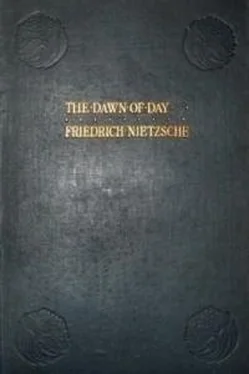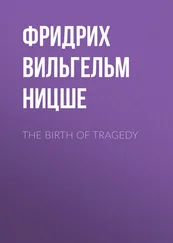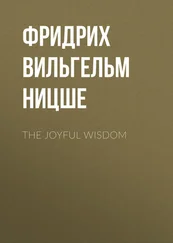113.
STRIVING FOR DISTINCTION.—When we strive after distinction we must ceaselessly keep our eyes fixed on our neighbour and endeavour to ascertain what his feelings are; but the sympathy and knowledge which are necessary to satisfy this desire are far from being inspired by harmlessness, compassion, or kindness. On the contrary, we wish to perceive or find out in what way our neighbour suffers from us, either internally or externally, how he loses control over himself and yields to the impression which our hand or even our mere appearance makes on him. Even when he who aspires to distinction makes or wishes to make a joyful, elevating, or cheerful impression, he does not enjoy this success in that he rejoices, exalts, or cheers his neighbour, but in that he leaves his impress on the latter’s soul, changing its form and dominating it according to his will. The desire for distinction is the desire to subject one’s neighbour, even if it be merely in an indirect fashion, one only felt or even only dreamt of. There is a long series of stages in this secretly–desired will to subdue, and a very complete record of them would perhaps almost be like an excellent history of culture from the early distortions of barbarism down to the caricatures of modern over–refinement and sickly idealism.
This desire for distinction entails upon our neighbour—to indicate only a few rungs of the long ladder—torture first of all, followed by blows, then terror, anxious surprise, wonder, envy, admiration, elevation, pleasure, joy, laughter, derision, mockery, sneers, scourging and self–inflicted torture. There at the very top of the ladder stands the ascetic and martyr, who himself experiences the utmost satisfaction, because he inflicts on himself, as a result of his desire for distinction, that pain which his opposite, the barbarian on the first rung of the ladder, inflicts upon those others, upon whom and before whom he wishes to distinguish himself. The triumph of the ascetic over himself, his introspective glance, which beholds a man split up into a sufferer and a spectator, and which henceforth never looks at the outside world but to gather from it, as it were, wood for his own funeral pyre: this final tragedy of the desire for distinction which shows us only one person who, so to speak, is consumed internally—that is an end worthy of the beginning: in both cases there is an inexpressible happiness at the sight of torture; indeed, happiness considered as a feeling of power developed to the utmost, has perhaps never reached a higher pitch of perfection on earth than in the souls of superstitious ascetics. This is expressed by the Brahmins in the story of King Visvamitra, who obtained so much strength by thousands of years of penance that he undertook to construct a new heaven. I believe that in the entire category of inward experiences the people of our time are mere novices and clumsy guessers who “try to have a shot at it”: four thousand years ago much more was known about these execrable refinements of self–enjoyment. Perhaps at that time the creation of the world was imagined by some Hindu dreamer to have been an ascetic operation which a god took upon himself! Perhaps this god may have wished to join himself to a mobile nature as an instrument of torture in order thus to feel his happiness and power doubled! And even supposing him to have been a god of love: what a delight it would have been for him to create a suffering mankind in order that he himself might suffer divinely and super–humanly from the sight of the continual torture of his creatures, and thus to tyrannise over himself! And, again, supposing him to have been not only a god of love, but also a god of holiness, we can scarcely conceive the ecstasies of this divine ascetic while creating sins and sinners and eternal punishment, and an immense place of eternal torture below his throne where there is a continual weeping and wailing and gnashing of teeth!
It is not by any means impossible that the soul of a St. Paul, a Dante, or a Calvin, and people like them, may once have penetrated into the terrifying secrets of such voluptuousness of power, and in view of such souls we may well ask whether the circle of this desire for distinction has come to a close with the ascetic. Might it not be possible for the course of this circle to be traversed a second time, by uniting the fundamental idea of the ascetic, and at the same time that of a compassionate Deity? In other words, pain would be given to others in order that pain might be given to one’s self, so that in this way one could triumph over one’s self and one’s pity to enjoy the extreme voluptuousness of power.—Forgive me these digressions, which come to my mind when I think of all the possibilities in the vast domain of psychical debaucheries to which one may be led by the desire for power!
114.
ON THE KNOWLEDGE OF THE SUFFERER.—The state of sick men who have suffered long and terribly from the torture inflicted upon them by their illness, and whose reason has nevertheless not been in any way affected, is not without a certain amount of value in our search for knowledge—quite apart from the intellectual benefits which follow upon every profound solitude and every sudden and justified liberation from duties and habits. The man who suffers severely looks forth with terrible calmness from his state of suffering upon outside things: all those little lying enchantments, by which things are usually surrounded when seen through the eye of a healthy person, have vanished from the sufferer; his own life even lies there before him, stripped of all bloom and colour. If by chance it has happened that up to then he has lived in some kind of dangerous fantasy, this extreme disenchantment through pain is the means, and possibly the only means, of extricating him from it. (It is possible that this is what happened to the Founder of Christianity when suspended from the Cross; for the bitterest words ever pronounced, “My God, My God, why hast Thou forsaken Me?” if understood in their deepest sense, as they ought to be understood, contain the evidence of a complete disillusionment and enlightenment in regard to the deceptions of life: in that moment of supreme suffering Christ obtained a clear insight into Himself, just as in the poet’s narrative did the poor dying Don Quixote.)
The formidable tension of the intellect that wishes to hold its own against pain shows everything that one now looks upon in a new light, and the inexpressible charm of this new light is often powerful enough to withstand all the seductiveness of suicide and to make the continuation of life seem very desirable to the sufferer. His mind scornfully turns to the warm and comfortable dream–world in which the healthy man moves about thoughtlessly, and he thinks with contempt of the noblest and most cherished illusions in which he formerly indulged. He experiences delight in conjuring up this contempt as if from the depths of hell, and thus inflicting the bitterest sufferings upon his soul: it is by this counterpoise that he bears up against physical suffering—he feels that such a counterpoise is now essential! In one terrible moment of clear–sightedness he says to himself, “Be for once thine own accuser and hangman; for once regard thy suffering as a punishment which thou hast inflicted on thyself! Enjoy thy superiority as a judge: better still, enjoy thine own will and pleasure, thy tyrannical arbitrariness! Raise thyself above thy life as above thy suffering, and look down into the depth of reason and unreason!”
Our pride revolts as it never did before, it experiences an incomparable charm in defending life against such a tyrant as suffering and against all the insinuations of this tyrant, who would fain urge us to give evidence against life,—we are taking the part of life in the face of this tyrant. In this state of mind we take up a bitter stand against all pessimism in order that it may not appear to be a consequence of our condition, and thus humiliate us as conquered ones. The charm of being just in our judgments was also never greater than now; for now this justice is a triumph over ourselves and over so irritated a state of mind that unfairness of judgment might be excused,—but we will not be excused, it is now, if ever, that we wish to show that we need no excuse. We pass through downright orgies of pride.
Читать дальше











